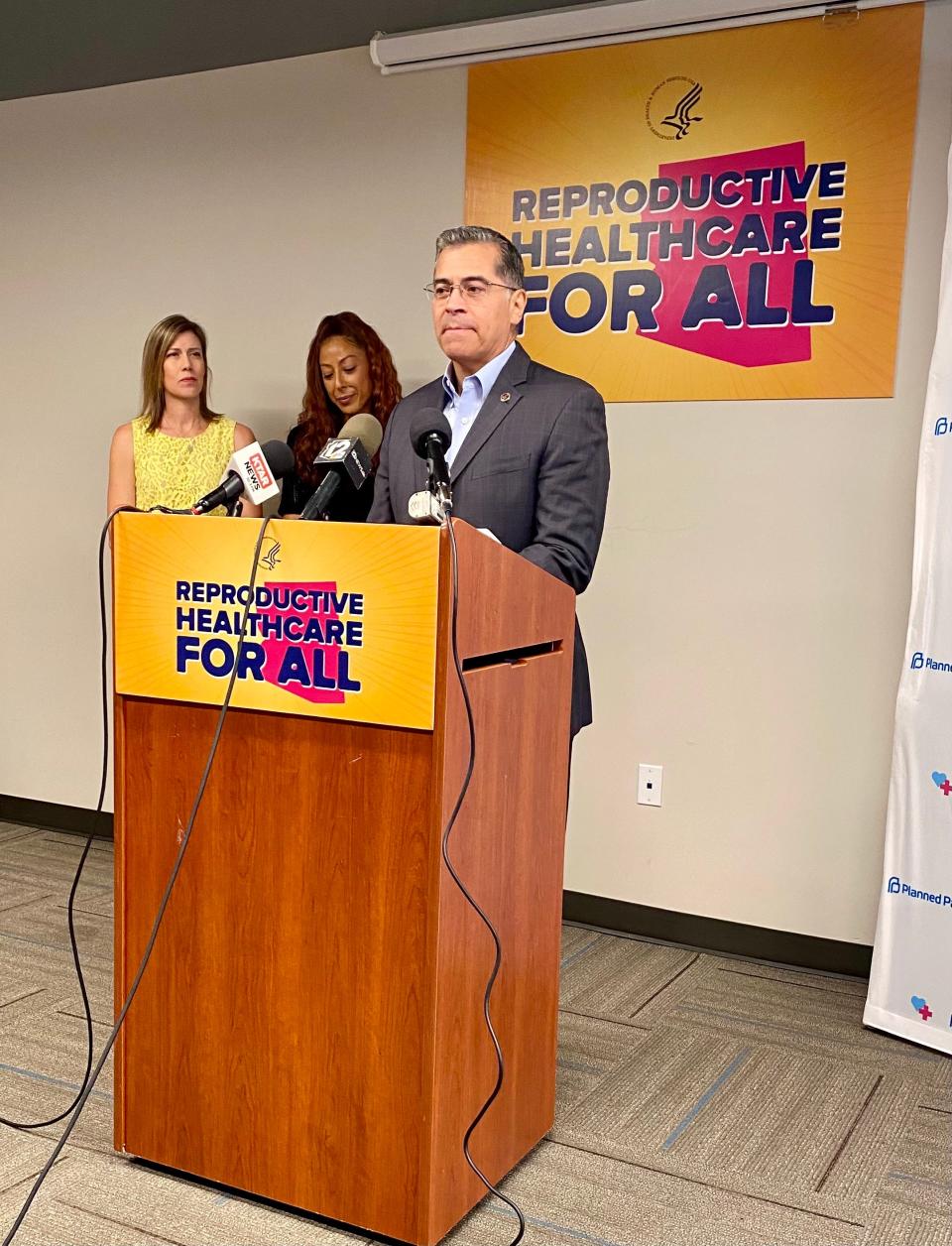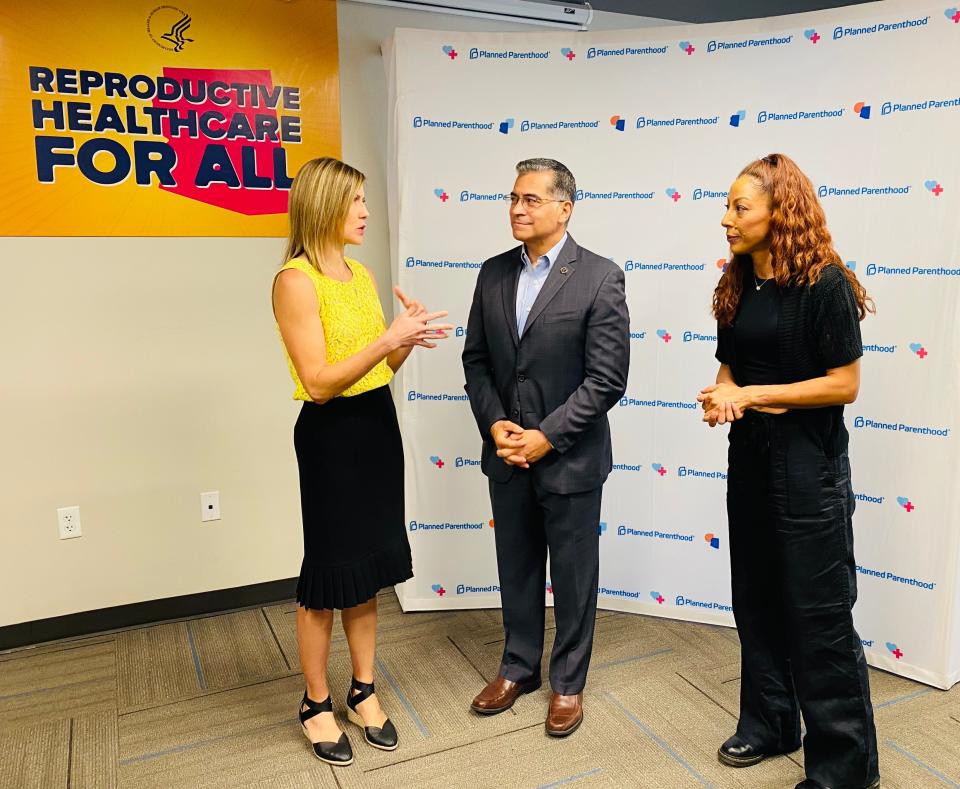5 things to know about abortion in Arizona 2 years after the Dobbs decision
Arizona was instantly thrown into chaos two years ago when the U.S. Supreme Court overturned its landmark 1973 Roe vs. Wade ruling, and the tumult continues now, a top federal health official said during a stop in Phoenix Thursday.
U.S. Health and Human Services Secretary Xavier Becerra visited the headquarters of Planned Parenthood Arizona in the state's capital city four days before the two-year anniversary of the landmark Dobbs vs. Jackson Women's Health Organization decision on abortion access. The visit was part of a national tour to underscore what Becerra said is the Biden administration's commitment to reproductive freedom.
"We want people to know that in America, President (Joe) Biden believes you should have the right to have peace of mind. But you can't have peace of mind unless you have rights," Becerra told reporters and abortion rights advocates at the event.
"President Biden wants you to have the rights to access the health care you need, whatever that health care is, including reproductive rights, including abortion rights, so we're going to continue to fight."
In the Dobbs decision, the justices ruled that, for the first time in nearly 50 years, states could set their own abortion laws without any federal standard protecting abortion access.
In Arizona, the Dobbs decision ignited confusion, a court battle and intermittent stops in abortion care. Abortion providers throughout the state, including Planned Parenthood Arizona, lost staff members and had trouble hiring new ones.
As a result, patients in the state frequently ask medical providers and abortion clinics about the current status of the law, said Dr. Jill Gibson, chief medical officer for Planned Parenthood Arizona, who spoke alongside Becerra.

"Because of the hostile, dehumanizing and undignified way that our courts have rolled back abortion rates, I am constantly supporting concerned, hesitant patients who come in for an abortion and are unsure of the laws," Gibson said.
"They ask if they will be criminalized for receiving or even seeking abortion services. My staff often feels similarly concerned about risks involved in providing abortion care."
Becerra says he's guiding the public to a federal government site about reproductive rights for more information: https://reproductiverights.gov/.
"We wanted people to understand their rights, know what services they had accessible to them, and so we stood that up," Becerra said. "It's really important to try to get people the correct information because there's so much disinformation."
Here are five things to know about the law on abortions in Arizona:
Abortion remains legal in Arizona
Cathi Herrod, a lawyer who is president of the conservative Center for Arizona Policy, disputes the descriptions of post-Dobbs confusion.
"There is nothing confusing about the abortion law in Arizona. Abortion is legal up to 15-weeks and beyond that for medical emergencies," Herrod said. "The abortion industry is stirring up chaos in an effort to pass extreme abortion policies. They are playing on the fears of women and that is cruel."
Current state law says abortion is legal in Arizona up to 15 weeks gestation, with no exceptions for rape or incest.
At any point in the pregnancy, including after 15 weeks, abortion is legal if a doctor determines that there is a medical emergency. “Medical emergency” is defined by state law to mean a situation where immediate abortion care is necessary to avoid the patient’s death, or when delaying abortion care will create a serious risk of substantial and irreversible impairment of a major bodily function, Arizona Attorney General Kris Mayes' office says.

Arizona law also makes it illegal for doctors to perform abortions for certain impermissible reasons. For example, if the abortion is sought because of the sex or race or the fetus.
Both surgical and medication abortions are legal in the state. Medication abortions, sometimes referred to as abortion pills, are two-drug combination recommended for use up to 10 weeks of pregnancy.
A 19th century near-total abortion ban likely won't take effect this year
Ever since a near-total abortion ban that called for imprisoning doctors who perform abortions was upheld by the Arizona Supreme Court April 9 and attracted national headlines there has been speculation about when the law would take effect.
The Arizona Legislature repealed the ban when it passed House Bill 2677, which Democratic Arizona Gov. Katie Hobbs subsequently signed into law. Since new laws don't typically take effect until 91 days after the end of the legislative session, the question of whether the near-total ban would take effect was unclear. The most recent session ended Saturday, which means the repeal will take effect Sept. 14, Mayes' office confirmed this week.
Mayes, a Democrat, previously has said that enforcement of the 1864 ban would be stayed by court orders until at least Sept. 27.
"Because the repeal will be effective before Sept. 27, that means the territorial ban will not take effect in Arizona, so long as current court orders remain in place," Mayes spokesperson Richie Taylor wrote Monday in an email.
Abortion rights advocates say Arizona's 15-week law is too restrictive
"So many of our patients are victims of sexual violence and the very nature of that assault may make it impossible for them to access abortion before the state's 15-week legal cut off," Gibson said. "The fact that we as physicians are unable to provide them care is simply outrageous."
Prior to September 2022, abortions in the state had been legal up until fetal viability, the point at which a fetus would have a significant chance of surviving outside the womb absent extraordinary measures. Fetal viability is typically at about 23 weeks or 24 weeks of gestation.
Voters may be asked to enshrine right to an abortion in state Constitution
A proposed constitutional amendment, called the Arizona Abortion Access Act, is expected to appear on the November general election ballot. It would create a "fundamental right" to obtain an abortion anytime before viability.
After viability, the act prevents the state from enacting, adopting or enforcing any law that denies, restricts or interferes with an abortion that "in the good faith judgment of a treating health care professional, is necessary to protect the life or physical or mental health of the pregnant individual,"
Anti-abortion advocates are working against the ballot initiative
The campaign against the proposed ballot initiative, called It Goes Too Far says the way the initiative is written lacks safeguards and is overly broad and vague.
Reach health care reporter Stephanie Innes at Stephanie.Innes@gannett.com or at 602-444-8369. Follow her on X, formerly known as Twitter: @stephanieinnes.
This article originally appeared on Arizona Republic: Five things to know about the legality of abortion in Arizona

